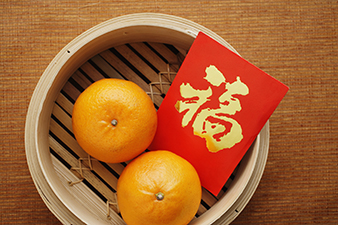Chinese New Year’s Dishes with ‘Destiny’

Chinese New Year occurs between January 21st and February 20th and continues for 15 days into the first month of the New Year. This year is the Year of the Goat and those born in Goat years are considered calm, gentle, creative and honest. Chinese New Year is the traditional time for families to gather, enjoy each others’ company and celebrate with lots of food. Chinese communities celebrate in Mainland China, Hong Kong, Taiwan, Singapore, Thailand, Indonesia, Malaysia, Philippines and in Chinatowns all over the world. Because my staff is like family, I love to treat them to a Chinese New Year’s banquet on the first day, which this year fell on February 19. We gathered at a well-known Chinese seafood restaurant here in the San Gabriel Valley, which is ground zero for the Asian community in Southern California.
The whole idea of celebrating Chinese New Year is to share abundance, which is exactly what we did. We had all my favorite foods for the holiday, including a variety of dim sum, steamed salty egg bun, shrimp dumplings, juicy pork dumplings, fried chicken feet, whole fish, long noodles with lobster, sweet and sour pork, deep fried tofu, garlic bok choy and a delicious selection of sweets. Most of these delicacies have meaning and are symbolic of our hopes for peace and prosperity in the New Year:
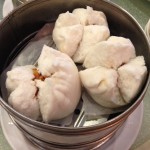 Pork and shrimp dumplings – Their round shape suggests money and prosperity. The legend is that the more dumplings you eat during the New Year celebrations, the more money you’ll make in the coming year.
Pork and shrimp dumplings – Their round shape suggests money and prosperity. The legend is that the more dumplings you eat during the New Year celebrations, the more money you’ll make in the coming year.
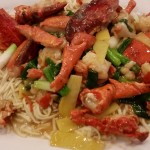 Long noodles — Noodles represent long life, so they should never be cut. Besides long noodles, the dish we enjoyed had lobster, scallions and large pieces of fragrant ginger.
Long noodles — Noodles represent long life, so they should never be cut. Besides long noodles, the dish we enjoyed had lobster, scallions and large pieces of fragrant ginger.
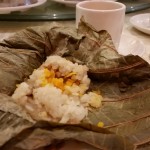 Long leafy greens – Our meal included a big platter of garlic sautéed baby bok choy served whole to wish long life for parents. We also had sticky rice flavored with egg yolk, pork and chicken, then wrapped and steamed in whole lotus leaves. The leaves and other leafy greens represent long life, honor and tranquility.
Long leafy greens – Our meal included a big platter of garlic sautéed baby bok choy served whole to wish long life for parents. We also had sticky rice flavored with egg yolk, pork and chicken, then wrapped and steamed in whole lotus leaves. The leaves and other leafy greens represent long life, honor and tranquility.
- Sweet and sour pork – This popular dish is served at Chinese New Year by families hoping for lots of grandchildren. This tradition started because the word for ‘sour’ and ‘grandchild’ sound similar in Cantonese.
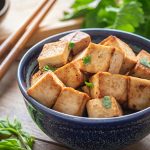 Fried tofu with abalone sauce – This dish has always been one of my favorites. It consists of large pieces of soft, creamy tofu, deep fried and served sitting in abalone sauce. Imagine a rich savory custard. Combined with the sauce, you have the ultimate in umami or ‘fifth taste,’ that complex, savory quality found in other satisfyingly rich foods such as cheese and mushrooms.
Fried tofu with abalone sauce – This dish has always been one of my favorites. It consists of large pieces of soft, creamy tofu, deep fried and served sitting in abalone sauce. Imagine a rich savory custard. Combined with the sauce, you have the ultimate in umami or ‘fifth taste,’ that complex, savory quality found in other satisfyingly rich foods such as cheese and mushrooms.
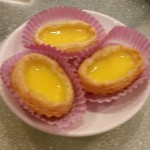 Deep fried sesame balls (jin deui) and other sweets – Popular all year round, jin deui take on special meaning during Chinese New Year because their round shape and golden color are considered lucky. The fact that the dough expands when fried suggests that a small investment will bring a large return. These are made of chewy rice flour and are filled with sweet bean paste. Other sweets we enjoyed were custardy egg tarts with flaky crust and baked milk buns filled with a light, creamy filling scented with coconut.
Deep fried sesame balls (jin deui) and other sweets – Popular all year round, jin deui take on special meaning during Chinese New Year because their round shape and golden color are considered lucky. The fact that the dough expands when fried suggests that a small investment will bring a large return. These are made of chewy rice flour and are filled with sweet bean paste. Other sweets we enjoyed were custardy egg tarts with flaky crust and baked milk buns filled with a light, creamy filling scented with coconut.
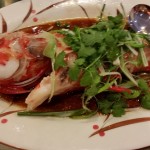 Whole fish – This is traditional because the Chinese word for ‘fish’ sounds like the word for ‘surplus,’ as in, “May you always have more than enough.” The rule is that the fish must be served with the head and tail intact, so you have a good year start to finish. The other rule we always observe is to never turn the fish over. This comes from a tradition among fishermen and sailors, who believed doing so might make their boats capsize. Our fish was steamed red cod that had been swimming in a tank just a few minutes before our meal. That’s fresh!
Whole fish – This is traditional because the Chinese word for ‘fish’ sounds like the word for ‘surplus,’ as in, “May you always have more than enough.” The rule is that the fish must be served with the head and tail intact, so you have a good year start to finish. The other rule we always observe is to never turn the fish over. This comes from a tradition among fishermen and sailors, who believed doing so might make their boats capsize. Our fish was steamed red cod that had been swimming in a tank just a few minutes before our meal. That’s fresh!
Another tradition I love at Chinese New Year is the giving of gifts. Wrapping money in red packets represents good luck and happiness to the receivers. I give my staff a token amount of money in red envelopes decorated with gold to wish them well for the New Year. Most people keep the envelopes unopened for the whole year, because the red envelopes are as lucky as the money in them.
 To add to wishes of good fortune, each year I follow the custom of displaying and giving gifts of oranges and tangerines grown organically in my own citrus groves near San Diego. The fruits are at the peak of ripeness this time of year and I enjoy the opportunity to share them with friends, family and colleagues. The Chinese words for gold and orange sound alike, while the word for ‘tangerine’ sounds like the word for ‘luck.’ To make the gift even better, I keep the leaves attached as that symbolizes longevity. Many people also like to give pommelo, a very large citrus fruit native to Southeast Asia. They are bigger and sweeter than a grapefruit and the Cantonese word for ‘pommelo’ sounds like the words, ‘prosperity’ and ‘status.’ Delicious food shared with friends and family along with the symbolism of each dish gives practically every bite meaning. That is what I have always loved about Chinese New Year.
To add to wishes of good fortune, each year I follow the custom of displaying and giving gifts of oranges and tangerines grown organically in my own citrus groves near San Diego. The fruits are at the peak of ripeness this time of year and I enjoy the opportunity to share them with friends, family and colleagues. The Chinese words for gold and orange sound alike, while the word for ‘tangerine’ sounds like the word for ‘luck.’ To make the gift even better, I keep the leaves attached as that symbolizes longevity. Many people also like to give pommelo, a very large citrus fruit native to Southeast Asia. They are bigger and sweeter than a grapefruit and the Cantonese word for ‘pommelo’ sounds like the words, ‘prosperity’ and ‘status.’ Delicious food shared with friends and family along with the symbolism of each dish gives practically every bite meaning. That is what I have always loved about Chinese New Year.
